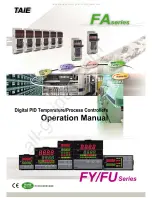
Commander SE Advanced User Guide
37
Issue Number: 4
current should be proportional to the torque produced by the machine. The active current will give a good indication of the
machine torque over most of the frequency range, however, the accuracy is reduced below 10Hz.
In both cases the relationship between the active current and motor torque will change once the maximum drive output
voltage or the rated voltage of the motor set by
5.09
is reached, whichever is the lowest. (Generally the maximum drive
output voltage will be just below the r.m.s. line supply voltage.) Once one of these limits is reached the voltage is held
constant and the motor flux reduces with frequency. This is referred to as field weakening or constant power operation. In this
region the relationship between torque and active current is approximately as follows, where K is a constant related to the
motor:
Torque
= K x active current x frequency at voltage limit / actual frequency
Normally the point at which the voltage limit is reached is close to the rated frequency of the motor.
*Units: % of rated active current
The current demand is limited by the Active current limit. If torque control mode is selected (
4.11
= 1) this becomes the active
current demand for the drive. The current demand is shown as percentage of rated active current which is defined by the user
set up of the drive. Below the frequency where the output voltage is limited, the torque demand and active current are the
same. Above the point where the voltage limit is active the torque and current are related by:
Current demand
= (
4.08
) x output frequency (
5.01
) / rated frequency (
5.06
)
=
4.08
x
5.01
/
5.06
*Units: % of rated active current
This parameter defines the current limit as a percentage of (
5.07
or
21.07
) x (
5.10
or
21.10
) rated active current. The
maximum value allowed for the motor rated current is the drive rated current. The maximum current limit parameter is given
by:
Therefore, by setting the motor rated current below the drive rated current it is possible to have a current limit higher than
165%. Therefore, an absolute maximum of 1000% is applied.
In frequency control mode (
4.11
= 0), the drive output frequency is modified if necessary to keep the active current within the
current limits as shown below:
The active current limit is compared with the active current and if the current exceeds the limit the error value passes through
the PI controller to give a frequency component which is used to modify the ramp output. The direction of the modification is
always to reduce the frequency to zero if the active current is motoring, or to increase the frequency towards the maximum if
the current is regenerating. Even when the current limit is active the ramp still operates, therefore the proportional and
integral gains (
4.13
and
4.14
) must be high enough to counter the effects of the ramp. For method of setting the gains see
4.13
and
4.14
.
In torque control mode the current demand is limited by the current limits. For operation of this mode see
4.11
.
4.03
Unused parameter
4.04
Current demand
Ú
±
Over-riding current limit
Ö
*
RO
Bi
P
4.05~
4.06
Unused parameters
4.07
Current limit
Ú
0 ~ +
Maximum current limit
Ö
165
*
RW
Uni
Maximum current limit
= 100 x
Drive rated current
√
1.25 + power factor (
5.10
)
2
Motor rated current (
5.07
) x power factor (
5.10
)
Ramp
Current limit
active
P 04.13
I 04.14
Active
current
Current
limit
1
0
Post ramp
reference
+
-
Active
















































